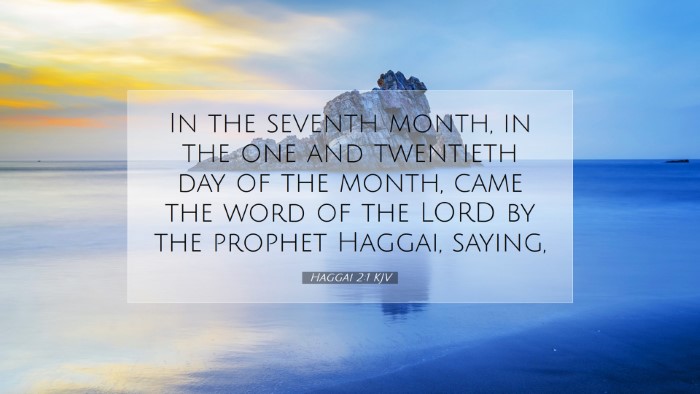Old Testament
Genesis Exodus Leviticus Numbers Deuteronomy Joshua Judges Ruth 1 Samuel 2 Samuel 1 Kings 2 Kings 1 Chronicles 2 Chronicles Ezra Nehemiah Esther Job Psalms Proverbs Ecclesiastes Song of Solomon Isaiah Jeremiah Lamentations Ezekiel Daniel Hosea Joel Amos Obadiah Jonah Micah Nahum Habakkuk Zephaniah Haggai Zechariah MalachiHaggai 2:1
Haggai 2:1 KJV
In the seventh month, in the one and twentieth day of the month, came the word of the LORD by the prophet Haggai, saying,
Haggai 2:1 Bible Commentary
Commentary on Haggai 2:1
Haggai 2:1 states, "In the seventh month, on the twenty-first of the month, the word of the Lord came by Haggai the prophet, saying." This verse marks a specific time for God's communication through Haggai, indicating the significance of both the date and the message that follows.
Contextual Background
In the background of Haggai’s ministry, the Israelites had returned from exile in Babylon and faced discouragement in their efforts to rebuild the temple. The historical context points to a post-exilic community struggling to revive their national identity and religious practices. The timing is crucial; the seventh month is important in the Jewish calendar, closely associated with the Feast of Tabernacles, a time of remembrance and restoration.
The Significance of Timing
- Seventh Month: This month (Tishrei) is historically rich, encompassing key Jewish festivals, including the Day of Atonement and the Feast of Tabernacles. Haggai strategically chooses this period to convey a pivotal message from God.
- Twenty-First Day: This day is particularly noteworthy as it coincides with the conclusion of the Feast of Tabernacles, a time when the people reflect on God’s provision during their time in the wilderness.
Divine Communication
As Haggai proclaims that "the word of the Lord came," this establishes the authority of his message as divinely ordained. Both Matthew Henry and Albert Barnes emphasize that God takes the initiative in addressing His people, demonstrating His ongoing relationship and concern for them.
Matthew Henry remarks that the Lord's word is timely and necessary, meant to inspire the People of Israel during their moment of uncertainty. Henry also underscores that the Lord provides guidance at moments when human effort seems futile.
Encouragement to the People
This verse acts as a prelude to the encouraging messages God unfolds in Haggai’s prophecy. Adam Clarke notes that this timing is intentional, designed to bolster the spirits of a dispirited community. The fact that the prophecy begins on such a notable day indicates God’s desire for His people to remember His faithfulness during difficult times.
Call to Reflection
The directness of God's message through Haggai calls the people to reflect; it serves as a reminder that divine instructions often come during seasons of national and personal turmoil. Haggai’s ministry guides the community to focus on their spiritual priorities, primarily the importance of rebuilding the temple.
Henry points out that the physical act of rebuilding is intertwined with their spiritual revival, suggesting that faith and action must go hand in hand. As God speaks, He is not only offering a message of correction but also an invitation to renewed commitment and activity in their covenant relationship.
Implications for Today
For pastors, students, and theologians, Haggai 2:1 prompts essential questions about the timing of God’s messages and the conditions under which we receive them. The emphasis on God speaking at significant moments can inspire modern believers to seek and expect God’s voice in challenging seasons.
- Understanding God's Timing: Recognizing that God communicates in our moments of struggle.
- The Importance of Worship: Reflecting on the Feast of Tabernacles can lead to deeper understanding of communal worship and God’s sustaining power.
- Revitalization of Purpose: Encouraging congregations to engage in projects that build not just physical structures but spiritual community.
Conclusion
Haggai 2:1 serves as a poignant reminder of God’s active role in guiding His people. The words of Haggai signal a moment where despair is met with divine purpose, encouraging faithfulness to God’s commands during challenging times. As the community of faith engages with this text, they are invited into a deeper relationship with God, reaffirming His presence and promises in their lives today.


